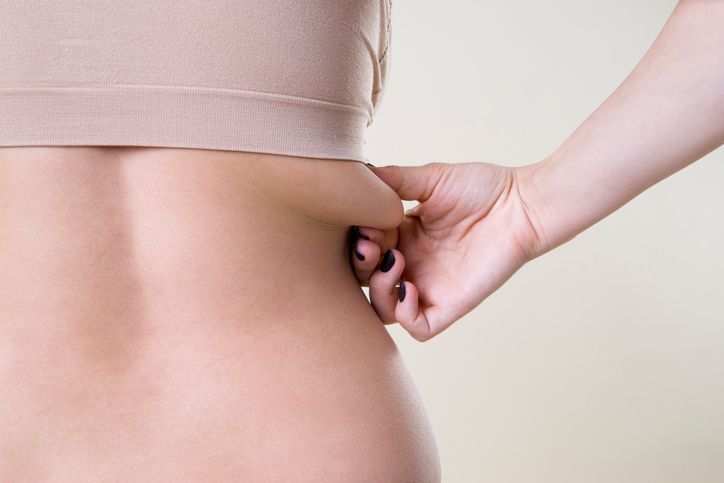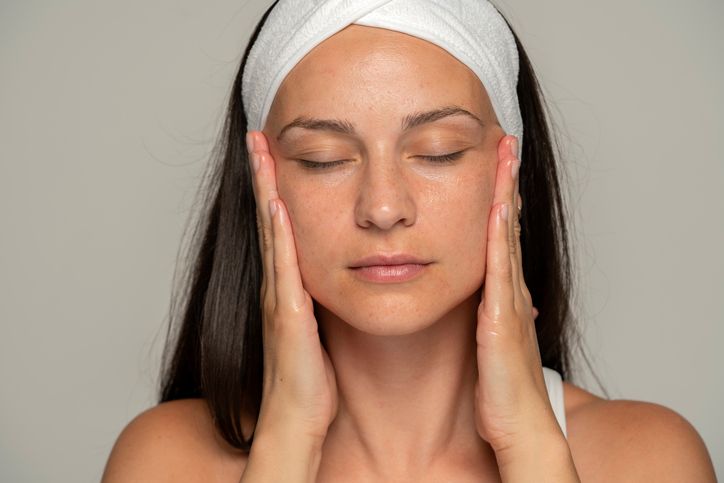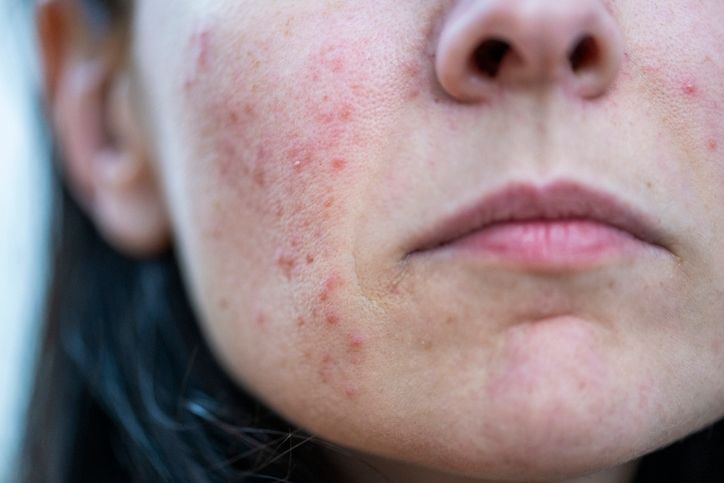
Author: Natalie Ng|Updated: 3 June 2025
Your body keeps burning calories even when you’re asleep. With the right habits, you can make that process even more effective. Things like keeping your bedroom cool and dark, sticking to a regular sleep schedule, and avoiding big meals late at night can all help. Adequate sleep is crucial for regulating appetite hormones, supporting effective dieting, and maintaining weight loss. Simple habits like winding down before bed, writing in a journal, or sipping on chamomile tea can also help you sleep better and support fat loss. These small changes might seem simple, but they can make a big difference over time. Want to learn how these habits can help with fat loss? Let’s take a closer look.
Sleep Habit For Fat Loss 1: Sleep In A Cool Bedroom

Cool Bedrooms Don’t Directly Burn Fat
Sleeping in a cool bedroom won’t directly boost fat burning. This idea comes from research on brown fat, but those effects happen during the day when you’re awake, not while you sleep.
How a Cool Room Supports Fat Loss
A cool bedroom—between 60 and 67°F (15 to 19°C)—can help improve sleep quality. Better sleep helps balance appetite regulating hormones such as leptin and ghrelin. These hormones control hunger and fullness. Poor sleep or sleep deprivation can disrupt these hormones, leading to increased food intake and higher body weight.
Good sleep also helps you stick to healthy eating habits and regular physical activity, which support weight loss and weight management. Sleep deprivation can lead to more cravings, a higher body mass index, and greater weight gain over time.
Create a Comfortable Sleep Space for Better Rest
Instead of focusing only on the temperature for fat burning, aim for a comfortable sleep space. Use breathable bedding, keep the room dark, and try to stick to a regular sleep schedule. These healthy sleep habits can improve sleep quality, support weight loss efforts, and help maintain weight loss over time.
Sleep Habit For Fat Loss 2: Follow A Regular Sleep Schedule
Why a Regular Sleep Schedule Matters
Sticking to a regular sleep schedule is just as important as diet and exercise when trying to lose weight. Going to bed and waking up at the same time every day helps regulate your body’s internal clock, or circadian rhythm. This rhythm controls the production of hormones that influence your metabolism and appetite.
How Sleep Timing Affects Hormones
A stable sleep routine supports proper hormonal release, including cortisol and growth hormone. These hormones play a key role in fat metabolism, muscle maintenance, and overall weight management. Poor sleep timing or irregular schedules can disrupt this balance and lead to weight gain.
Best Ways to Adjust Your Sleep Pattern
Aim for 7–9 hours of sleep each night within a regular schedule. Choose a bedtime and wake-up time that works for your lifestyle, and try to stick to it, even on weekends. If your current sleep pattern is off, make small changes—adjust by 15–30 minutes every few days to help your body adjust without causing sleep loss.
Book Now to Experience
S6 Body Sculpting Treatment
1 Minute Self-Registration
Date should not be before minimal date
Sleep Habit For Fat Loss 3: Sleep In Total Darkness
Importance of Darkness for Melatonin and Metabolism
Sleeping in complete darkness helps your body produce melatonin, a hormone that plays a key role in regulating sleep and metabolism. Melatonin production increases when there’s no light in your environment. Higher melatonin levels improve sleep quality and may support fat loss by helping regulate appetite and energy balance.
Tools to Achieve Total Darkness
To create a dark sleep environment, use blackout curtains or shades to block outside light from street lamps or the morning sun. Cover small lights from electronics, like clocks or chargers, with electrical tape or remove them from your bedroom. Door sweeps and draft stoppers can help block light coming from hallways or gaps under doors.
If you can’t achieve full darkness, try a sleep mask made from breathable fabric with an adjustable strap. If you need a nightlight for safety, use dim red lights, as they affect melatonin production less than blue or white light.
Benefits of Sleeping in Darkness
Sleeping in complete darkness can help lower cortisol levels, which is important for fat burning and weight management. A dark room also promotes deeper sleep cycles, including slow wave sleep, which supports fat metabolism and muscle recovery.
Sleep Habit For Fat Loss 4: Timing Your Last Meal

Eating Too Late Can Affect Fat Loss
The timing of your last meal matters for fat loss. Eating close to bedtime can shift your body’s focus toward digestion instead of fat burning. To support fat loss, aim to finish your last meal at least three hours before you go to bed.
How Meal Timing Supports Fat Metabolism
Giving your body time to digest before bed helps it focus on burning stored fat overnight. When your stomach isn’t busy processing food, your metabolism can shift into fat-burning mode during deep sleep.
What to Eat if You’re Hungry Before Bed
If you need to eat closer to bedtime, choose lighter, protein-rich foods. Avoid heavy, high-calorie meals that can disrupt sleep and increase body fat. Light snacks like yogurt, a boiled egg, or a small portion of almonds can keep you satisfied without interfering with your body’s fat-burning process.
Eating earlier in the evening also helps regulate appetite hormones and supports healthy body weight over time.
Sleep Habit For Fat Loss 5: Nighttime Relaxation Techniques for Fat Loss
Relaxation Before Bed Improves Sleep and Supports Fat Loss
Relaxation techniques before bed help your body wind down, lower stress levels, and improve sleep quality. When you’re less stressed, your body produces less cortisol, a hormone linked to increased fat storage, especially around the belly.
Deep Breathing Helps You Fall Asleep
Taking deep breaths can calm your nervous system and lower your heart rate, creating the right conditions for sleep. Try placing one hand on your chest and the other on your belly. Inhale slowly through your nose for four counts, hold for two counts, and exhale through your mouth for six counts. Repeat this 5-10 times until you feel relaxed.
This simple practice can help lower cortisol levels, reduce stress, and prepare your body for deep sleep, which supports overnight fat burning.
Meditation Helps Reduce Stress Hormones
A short meditation before bed helps clear your mind and calm your body. Focus on your breath, or try a body scan by paying attention to each part of your body from head to toe. If your mind wanders, gently bring it back to your breathing.
Meditation helps reduce stress hormones that can lead to weight gain. It also promotes better sleep, which supports fat loss and weight control.
Journaling Can Clear Your Mind Before Sleep
Writing down your thoughts before bed can help clear your mind and reduce mental tension. Take 10 minutes to jot down any worries, ideas, or things you’re grateful for. Write down your goals for the next day, so they don’t keep you up at night.
This simple habit can reduce cortisol levels, support better sleep, and help you maintain a healthy weight over time.
Book Now to Experience
S6 Body Sculpting Treatment
1 Minute Self-Registration
Date should not be before minimal date
Sleep Habit For Fat Loss 6: Intake Of Sleep-Friendly Foods and Supplements
Foods That Support Better Sleep
Certain foods can help improve sleep quality and support fat loss. Magnesium-rich foods like almonds, pumpkin seeds, and leafy greens help relax your nervous system and promote deeper sleep. Tryptophan-containing foods, such as turkey, eggs, and dairy products, boost serotonin levels, which makes it easier to fall asleep and stay asleep.
If you’re hungry before bed, choose a light snack that combines complex carbs and protein, like whole-grain toast with almond butter or a small bowl of oatmeal. This can help you fall asleep without disrupting your body’s fat-burning processes.
Supplements That Can Help
If you struggle to fall asleep, certain supplements may help. Melatonin is a natural hormone your body makes to regulate the sleep-wake cycle, and taking it as a supplement can help if your levels are low. Valerian root and chamomile tea are also known for their calming effects and may help you relax before bed.
Cherry juice is another option—it contains natural melatonin and can help support sleep quality.
What to Avoid Before Bed
To support fat loss, avoid caffeine, alcohol, and heavy meals close to bedtime. These can disrupt sleep patterns, lead to poor sleep quality, and interfere with your body’s ability to burn fat overnight.
Choosing the right foods and supplements, and timing them well, can improve sleep quality and support fat loss goals.
Why Sleep Duration Affects Fat Loss

Short Sleep Duration Can Lead to Weight Gain
Many people focus on diet and exercise when trying to lose weight, but sleep duration is just as important. Studies show that short sleep duration—getting fewer than seven hours of sleep per night—is linked to greater weight gain and a higher body mass index. This happens because lack of sleep affects hormones like leptin and ghrelin, which control hunger and fullness. When you’re sleep deprived, these hormones shift, leading to increased food intake and a higher chance of weight gain.
Getting Enough Sleep Supports Fat Loss
Sleeping at least seven to nine hours per night helps regulate hormones and supports fat metabolism. People who get sufficient sleep tend to eat fewer calories and make better food choices, which is essential for creating a negative energy balance and promoting fat loss. Without enough sleep, the body struggles to maintain a healthy resting metabolic rate and process calories efficiently. Adequate sleep improves weight loss effectiveness by supporting hormonal balance and encouraging healthier food decisions.
Sleep Loss Can Slow Weight Loss Efforts
Experimental restricted sleep in studies has shown negative effects on fat loss, with sleep-deprived participants eating more and losing less fat, even when following the same diet and exercise plan as a control group. Sleep deprivation can impede weight loss, making it harder to maintain progress or reach your goals.
Getting enough sleep is a key part of any effective weight loss plan. Focusing on sleep duration can help support fat loss, improve sleep quality, and reduce the risk of weight gain.
The Impact of Sleep Deprivation on Appetite Hormones
Sleep Loss Can Increase Hunger
When you don’t get enough sleep, your body’s hormone balance shifts. Sleep deprivation lowers leptin, the hormone that signals fullness, and increases ghrelin, the hormone that makes you feel hungry. This imbalance makes you feel hungrier and more likely to reach for high-calorie, energy-dense foods.
Sleep-deprived participants in studies have been shown to consume more calories, which can lead to weight gain over time. A lack of sleep can also increase cravings for sugar and processed foods, leading to higher caloric intake and slowing down fat loss efforts.
Managing Appetite for Better Weight Control
Getting enough sleep helps keep these hunger hormones balanced. When you sleep well, you’re more likely to make healthy food choices, stick to your weight loss plan, and manage your body weight effectively.
Book Now to Experience
S6 Body Sculpting Treatment
1 Minute Self-Registration
Date should not be before minimal date
Slow Wave Sleep and Its Impact On Fat Loss
Importance of Deep Sleep for Metabolism
Slow wave sleep, also known as deep sleep, is the stage when your body repairs itself, builds muscle, and supports fat burning. During this phase, your body releases growth hormone, which plays a key role in fat metabolism and muscle preservation.
Without enough deep sleep, your body struggles to maintain a healthy resting metabolic rate and process calories efficiently. Sleep restriction and poor sleep quality can disrupt this process, leading to weight gain and slower fat loss over time.
Supporting Deep Sleep
To encourage more deep sleep, focus on healthy sleep habits like sticking to a regular sleep schedule, keeping your room cool and dark, and avoiding caffeine and alcohol before bed. These steps can help improve sleep quality and support your fat loss goals.
Support Your Fat Loss Goals with the S6 Body Sculpting Treatment
While getting enough sleep, maintaining a regular sleep schedule, and creating healthy sleep habits can support fat loss, some areas of stubborn fat may still be difficult to reduce. This is where the S6 Body Sculpting Treatment can help.
The S6 Body Sculpting Treatment is a non-invasive body contouring option that works alongside your healthy lifestyle to enhance your fat loss efforts, especially for those areas that don’t respond well to sleep-based fat burning or regular exercise.
This treatment uses bio-laser technology to break down fat cells deep within the subcutaneous layer, turning them into fatty acids that the body naturally eliminates through the lymphatic system. Vacuum suction is then applied to stimulate lymphatic drainage, speeding up the removal of these fatty acids.
By combining the body’s natural fat-burning processes during deep sleep with targeted fat cell breakdown from the S6 Body Sculpting Treatment, you can achieve a more sculpted body shape over time. The treatment focuses on common problem areas like the waist, belly, arms, thighs, calves, above the knees, and underneath the buttocks, helping reduce fat without surgery or downtime.
Advantages of the S6 Body Sculpting Treatment
The S6 Body Sculpting Treatment offers several benefits:
• It’s non-invasive, painless, and gentle on the skin, with no need for needles or incisions.
• It works on stubborn fat areas that are difficult to lose, even with enough sleep, diet, and exercise.
• There’s no recovery period—so you can get back to your routine immediately after each session.
• The fat cells are permanently removed, helping prevent the rebound effect that can happen after dieting.
• It complements a healthy lifestyle, supporting your fat loss efforts and helping you maintain weight loss more effectively.
If you’re trying to lose weight and struggling with areas that just won’t slim down, the S6 Body Sculpting Treatment can help you achieve a more balanced body shape while you continue to improve your sleep habits and lifestyle.
Book S6 today and take the next step toward your fat loss goals.The Connection Between Mental Health, Sleep, and Fat Loss
Poor Sleep Can Affect Mood and Motivation
Lack of sleep doesn’t just make you feel tired—it also impacts your mood and mental health. Sleep deprivation has been linked to higher levels of stress, anxiety, and even depression. When your mental health is affected, it becomes harder to stick to a healthy routine, make smart food choices, and stay motivated for physical activity.
Sleep and Emotional Eating
Poor sleep can increase emotional eating, where you turn to food as a way to manage stress or negative emotions. This can lead to increased calorie intake, higher body weight, and slower fat loss over time.
Prioritizing Sleep for a Healthy Mind and Body
Getting enough sleep each night supports your mental health, which plays a key role in long-term fat loss and weight management. When you feel well-rested and balanced, you’re more likely to make positive lifestyle choices that help with fat loss, such as sticking to a regular exercise routine, preparing healthy meals, and avoiding excessive calorie intake.
Book Now to Experience
S6 Body Sculpting Treatment
1 Minute Self-Registration
Date should not be before minimal date
FAQ
Can poor sleep quality slow down weight loss even if I exercise regularly?
Yes, poor sleep quality can reduce the effectiveness of your weight loss efforts, even if you follow a regular exercise routine. Sleep deprivation affects appetite hormones like ghrelin and leptin, which can increase food intake and cravings for energy-dense foods. It also impacts your body’s ability to regulate fat metabolism and maintain a healthy body mass index. Without enough sleep, you may struggle to maintain a negative energy balance, making it harder to lose fat over time.
How does sleep duration affect hunger and food intake?
Sleep duration plays a big role in controlling hunger and regulating daily calorie intake. People who get fewer hours of sleep tend to experience stronger cravings and eat more calories the following day. This is because lack of sleep increases ghrelin levels, the hormone that stimulates appetite, and decreases leptin, which signals fullness. Longer sleep duration helps keep these hormones in balance, reducing the risk of overeating and helping with weight control.
Can deep sleep help improve body composition?
Yes, deep sleep, or slow wave sleep, is essential for fat metabolism and maintaining a healthy body composition. During deep sleep, your body releases growth hormone, which helps with fat burning and muscle recovery. Poor sleep quality or insufficient deep sleep can slow down these processes, leading to higher fat storage and reduced muscle maintenance, which can negatively affect your body composition over time.
How does sleep deprivation affect mental health and weight loss?
Sleep deprivation is linked to higher levels of stress, anxiety, and poor mental health, all of which can make weight loss more difficult. Lack of sleep can increase cortisol levels, a stress hormone that promotes fat storage, especially around the belly. Poor mental health may also lead to emotional eating, irregular meal patterns, and less motivation for physical activity, which can contribute to weight gain and make it harder to stick to a weight loss plan.
Can I lose fat just by getting enough sleep without changing my diet?
Getting enough sleep supports fat loss by regulating appetite, improving hormonal balance, and boosting metabolism, but sleep alone won’t cause significant weight loss if you don’t also address your diet and physical activity levels. To achieve effective fat loss, it’s important to combine healthy sleep habits with balanced nutrition, regular physical activity, and treatments like the S6 Body Sculpting Treatment if you want to target stubborn fat areas.
Recommended Articles
COPYRIGHT© NEW BEAUTY MANAGEMENT LIMITED 2026. ALL RIGHT RESERVED.




